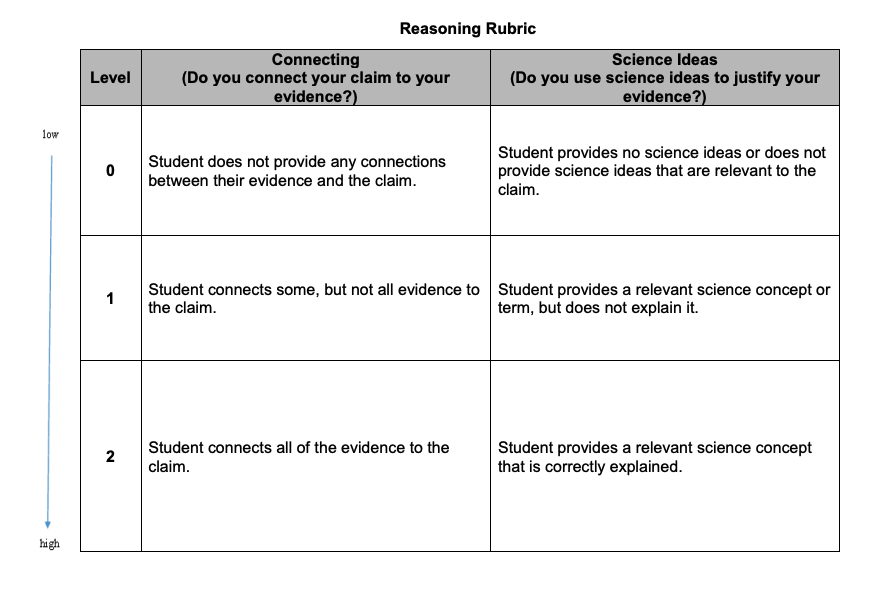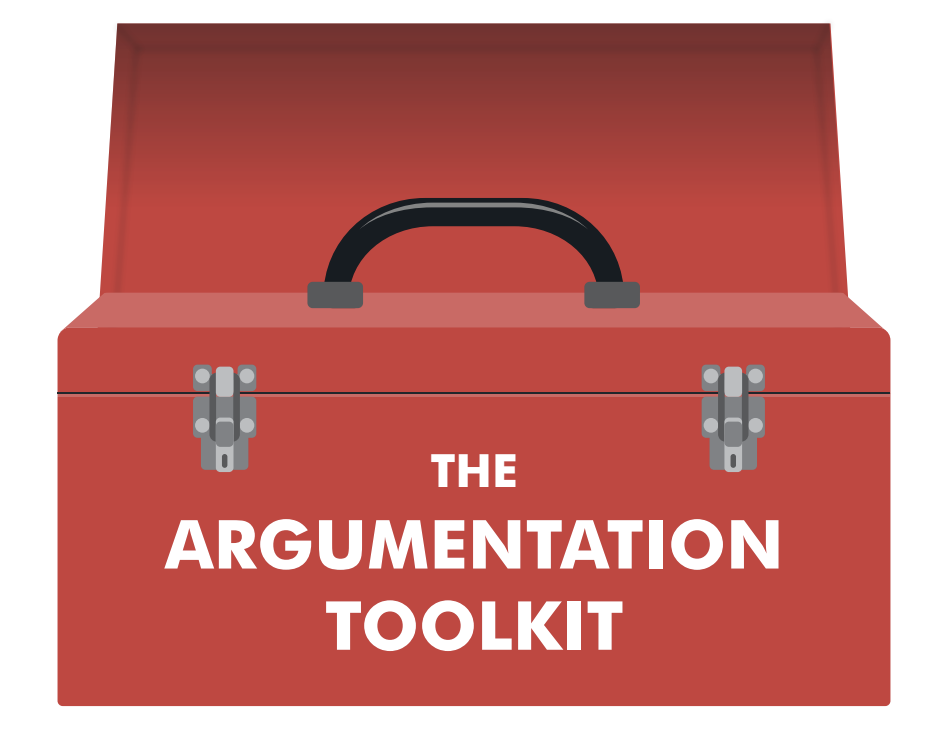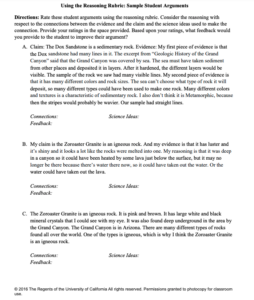How can you support student use of reasoning in a scientific argument?
Advanced Evidence and Reasoning Session 3
Session Goals:
- Teachers will encourage student use of reasoning by providing feedback on the connections students make between their evidence and the claim and their use of science ideas.
- Teachers will evaluate the quality of student evidence and reasoning in argument.
- Teachers will understand how classroom activities can support student reasoning.
Session Slides:
Advanced Evidence and Reasoning Session 3 PDF
Agenda:
*Extension Discussion – Using the Evidence Rubric!
- Video: Approach, Reasoning
- Presentation: Reasoning Rubric
- Activity: Using the Reasoning Rubric to Evaluate Student Arguments
- Takeaways
*Extension – Using the Reasoning Rubric!
*Extension Discussion – Using the Evidence Rubric!
Share your experience:
- Share the student argument you evaluated using the evidence rubric, as well as your evaluation of the argument and any feedback you would provide to the student.
Discussion Questions:
- What were the strengths of your student use of evidence? What were the weaknesses?
- How could you use this information about student use of evidence to guide your instruction?
- What challenges did you encounter in using the rubric?
1. Video: Approach, Reasoning
Discussion Questions:
- How do the activities featured in the video encourage students to use reasoning?
- What do your students encounter using reasoning?
- What challenges have you encountered in providing feedback to students on their reasoning in arguments?
2. Presentation: Reasoning Rubric
The goal of this session is to support student use of reasoning by focusing on providing feedback on two critical areas: connections between the evidence and claim and science ideas. The evidence rubric helps you identify strengths and weaknesses in student use of reasoning.

Note: There are questions at the top of each category in the rubric. This can guide your focus as a teacher, but can also support students in providing feedback to each other on their reasoning.Practice using the rubric:
.
This excerpt is from a class discussion about data collected from a simulation of metabolic processes in athletes playing soccer at low and high altitudes. The student is making the argument that soccer players at high altitude cannot play soccer as well as players at low altitude.
“For us we got the same thing, claim B, soccer players at high altitudes cannot play soccer as well as players at low altitude and well, our evidence, kind of the same as them, our sim extreme at low altitude it lasted for 1 minute and 15 seconds and breath rate was 44 and heart rate was 177 and then when it was high altitude it died and 44 seconds and the breath rate was 59 and the heart rate was 179.”
Discussion Questions:
- How would you rate the argument using the Reasoning Rubric?
- What feedback would you provide to the student?
3. Activity: Using the Reasoning Rubric to Evaluate Student Arguments
The task:
- Work in small groups to evaluate written student arguments using the rubric.
Contextual background:
Content:
- igneous= volcanic rock
- sedimentary= formed by the deposition and cementation of material
- metamorphic= previously formed rock changed by heat and pressure
Classroom:
- In this classroom activity, each student was assigned a different rock found near the Grand Canyon. Students observed rock samples in class and read scientific articles. They needed to write a scientific argument about the type of rock they were assigned.
Discussion questions:
- What strengths and weaknesses does using this rubric help you identify in student reasoning?
- How does this help you provide feedback to students?
- What future class activities might support these students in better articulating their reasoning?
4. Takeaways
- Common challenges students have with reasoning include connecting evidence with their claim and relating science ideas to the claim.
- Classroom activities can support students in articulating their reasoning, such as: hands-on investigations, group discussions, and evidence card sorts.
- Students can receive feedback on their reasoning by both their teacher and peers using the rubric.
*Extension- Using the Reasoning Rubric!
The task:
- Use the Reasoning Rubric to evaluate student reasoning in a written or oral argument.
- Be prepared to share your experiences using the rubric, including how the rubric was helpful for your instruction and what was challenging.
View Other Sessions
Advanced Evidence & Reasoning Agenda
| Session Name | Description | Length |
|---|---|---|
| Session #1: How are evidence and reasoning similar and different? | This session explores the overlap between evidence and reasoning in an argument, and helps teachers distinguish between the them. | 45 minutes |
| Session #2: How can you support student use of evidence in a scientific argument? | This session introduces the evidence rubric to help teachers provide feedback on student arguments. | 45 minutes |
| Session #3: How can you support student use of reasoning in a scientific argument? | This session introduces the reasoning rubric to help teachers provide feedback on student arguments. | 45 minutes |
| Session #4: How can you create classroom activities to target whole class challenges with evidence and reasoning? | This session provides teachers with work time to develop a lesson that supports student challenges with using evidence and/or reasoning. | 45 minutes |


